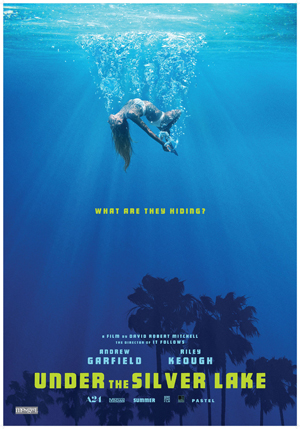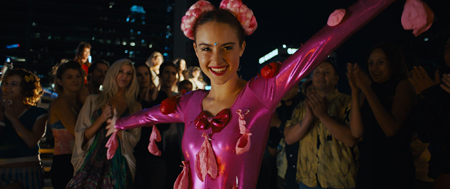Fantasia 2018, Day 8, Part 2: Under the Silver Lake and Laplace’s Witch
 Strangeness has many vectors; you can be weird in multiple directions at once. Whichever shape a movie takes, it’s often a good idea to have something strange in it. Something unexpected. You can usually count on movies at Fantasia to have at least one well-developed kind of weirdness in them, but the last two movies I saw on July 19, both at the large Hall Theatre, went in very different directions; one the strangest film (in a certain way) that I’d see this year, and the other imagining a world in which there is nothing unpredictable at all. The first was an odd Hollywood-set detective story, Under the Silver Lake. The second was Laplace’s Witch, an adaptation of a Japanese science-fiction novel, directed by Takashi Miike.
Strangeness has many vectors; you can be weird in multiple directions at once. Whichever shape a movie takes, it’s often a good idea to have something strange in it. Something unexpected. You can usually count on movies at Fantasia to have at least one well-developed kind of weirdness in them, but the last two movies I saw on July 19, both at the large Hall Theatre, went in very different directions; one the strangest film (in a certain way) that I’d see this year, and the other imagining a world in which there is nothing unpredictable at all. The first was an odd Hollywood-set detective story, Under the Silver Lake. The second was Laplace’s Witch, an adaptation of a Japanese science-fiction novel, directed by Takashi Miike.
Under the Silver Lake is directed by David Robert Mitchell, whose previous film It Follows was a surprise hit. This is very different from that quiet teen horror film; Silver Lake follows Sam (Andrew Garfield), an unemployed 33-year-old who spies on his female neighbours and has no obvious ambitions for his life. Somehow he attracts a new neighbour (Riley Keough), who promptly disappears. Sam’s half-assed attempt to find her leads him to a loopy world defined by stream-of-consciousness conspiracy theory. There are eccentric minicomics zines that hold the key to a murderous ghoul; a killer of dogs; a king of the homeless; secret messages in pop songs; clues hidden in an old issue of Nintendo Power; parties in assorted strange locations with assorted strange people; multiple trinities of women; and secrets underlying the geography of Los Angeles.
This film’s a maze, in which everything refers to everything else, and occasionally to things outside of the film. It’s about, among other things, a kind of search for profundity in popular culture, and how that search is doomed to failure. It’s about the anomie of a generation of young men. It’s about voyeurism, and women performing for the male gaze, intentionally and unintentionally. It’s about 140 minutes long (to paraphrase one overrated pop singer), but it feels longer, if only because of its intentionally episodic and elliptical structure. It’s sporadically funny, but not really a comedy. It sporadically provides clues, but is only nominally a mystery. It is consistently very well-shot, and very precise in its compositions and mise-en-scene. Mainly, though, what it is, is weird.
 Garfield’s Sam, a schlubby loser, wanders around in a haze through a variety of crass situations; and, occasionally, better-off and improbably attractive women are drawn to him. It’s easy to critique the movie as an example of straight white male nerd wish-fulfillment, but this is also a movie that seems to be aware of all those tropes. Is the depiction of women in the film, who here are so often nude or vicious or both, misogynistic or a deconstruction of misogyny? Or both? Or is Mitchell deliberately trying to make people uncomfortable by raising these issues? I found the film’s strangeness soon overwhelmed those questions, though for others I can see them remaining lively through the course of the shaggy-dog story. Personally I thought it was a movie that made it hard to focus on any one theme for long, shifting focus repeatedly even as images and symbols recur.
Garfield’s Sam, a schlubby loser, wanders around in a haze through a variety of crass situations; and, occasionally, better-off and improbably attractive women are drawn to him. It’s easy to critique the movie as an example of straight white male nerd wish-fulfillment, but this is also a movie that seems to be aware of all those tropes. Is the depiction of women in the film, who here are so often nude or vicious or both, misogynistic or a deconstruction of misogyny? Or both? Or is Mitchell deliberately trying to make people uncomfortable by raising these issues? I found the film’s strangeness soon overwhelmed those questions, though for others I can see them remaining lively through the course of the shaggy-dog story. Personally I thought it was a movie that made it hard to focus on any one theme for long, shifting focus repeatedly even as images and symbols recur.
It’s a movie about Sam looking for signs in trivial places, and (I think) about how that can ultimately lead only to trivia. It’s a critique of popular culture: at one point Sam encounters the guy who wrote every pop song every played on the radio, who mocks his own work as meaningless. Odd, though; that guy also plays a bit of Beethoven as a sample of his work. What’s going on here? Perhaps there’s a search for authenticity. Silver Lake is a neighbourhood of Los Angeles built around a reservoir — not a natural lake, but an artificial replica. One way to look at Sam’s journey is to say that he stumbles through a hipster’s view of history, in which a zine boasts about being established in 1928. Nothing’s real. This is a film world, a false world, a world in which a lake’s made by human hands. Does the title Under the Silver Lake echo Andrzej Zulawski’s On the Silver Globe? Then it’s an echo that emphasises how far from Zulawski’s epic this is, a mock-epic about a world notionally more real than Zulawski’s but ontologically falser.
 It’s difficult to describe the film’s hyper-referentiality, but let’s start with this: Andrew Garfield’s the lead. His character’s a detective named Sam, so evoking Sam Spade, and is the Christological age of 33 — except an aimless loser, if one who does go through a kind of baptism late in the film. Right away he’s carrying heavy symbolic freight from two very different sources. But set that aside. Garfield also played Spider-Man in two films; and an old issue of The Amazing Spider-Man appears here; and Garfield spends much of this movie in blue jeans with a red shirt. And his best buddy is played by Topher Grace, who played the Spider-Man villain Venom in a different set of Spider-Man movies. Is all this deliberate? (Does it matter that he’s looking for his blonde love, who turns out to have been abducted and possibly killed by a rich man, as Gwen Stacy by Norman Osborn?) Like I said, Sam finds meaning in pop songs before having the importance of popular music and popular culture deconstructed by the hidden songwriter behind all the great hits in the world — and Sam’s love interest is played by the granddaughter of Elvis Presley.
It’s difficult to describe the film’s hyper-referentiality, but let’s start with this: Andrew Garfield’s the lead. His character’s a detective named Sam, so evoking Sam Spade, and is the Christological age of 33 — except an aimless loser, if one who does go through a kind of baptism late in the film. Right away he’s carrying heavy symbolic freight from two very different sources. But set that aside. Garfield also played Spider-Man in two films; and an old issue of The Amazing Spider-Man appears here; and Garfield spends much of this movie in blue jeans with a red shirt. And his best buddy is played by Topher Grace, who played the Spider-Man villain Venom in a different set of Spider-Man movies. Is all this deliberate? (Does it matter that he’s looking for his blonde love, who turns out to have been abducted and possibly killed by a rich man, as Gwen Stacy by Norman Osborn?) Like I said, Sam finds meaning in pop songs before having the importance of popular music and popular culture deconstructed by the hidden songwriter behind all the great hits in the world — and Sam’s love interest is played by the granddaughter of Elvis Presley.
 You may think: that sounds like a meaningful web of coincidence, but what does it really add up to? And my point is exactly the same question can be asked of the film as a whole. It assembles a lot of signifiers, a lot of plot strands that move Sam through them, one thing following another in no logical or necessary order, a of bit information given here and a bit there and always the hint of more to follow. Does it all come to anything?
You may think: that sounds like a meaningful web of coincidence, but what does it really add up to? And my point is exactly the same question can be asked of the film as a whole. It assembles a lot of signifiers, a lot of plot strands that move Sam through them, one thing following another in no logical or necessary order, a of bit information given here and a bit there and always the hint of more to follow. Does it all come to anything?
I’m not sure it’s supposed to. I interpret the movie as a story about the shallowness of popular culture and film culture. I could be wrong; but I think the movie’s about the pointlessness of a search for meaning within that sphere, the ludicrousness of parsing the finest details of pop culture to find a web of meaning within. Sam talks to a friend of his about the sensation of being trapped in a dark timeline, of not living one’s best life; then they use a drone to spy on a random woman in her apartment. I think the movie’s about that lack of meaning, moral and otherwise. (I have to wonder if this is the film you get from a man who suddenly unexpectedly hit big, and then found the summit of success wasn’t what he’d always expected. There’s a disillusioned tone here that would fit with that; and, again, the casting of Garfield, unceremoniously dumped as Spider-Man, fits as well. It doesn’t sound like it from this interview, but who knows.) I note the film seems to speak to the current way of interpreting art, of whatever kind: subtle and perhaps unintentional connections found by internet discussion, theories linking image to image, ideas being seen where perhaps none was meant, meaning found in tea leaves and coffee grounds.
 The weird, rambling detective story in and around Los Angeles calls to mind any number of other films, Mulholland Drive, The Big Lebowski, the adaptation of Pynchon’s Inherent Vice. Like those movies, this one’s conscious of its artificiality, full of self-consciously clever bits. This is a film that’s likely to generate clickbait articles a decade from now with titles like “19 Things You Missed in Under the Silver Lake”. For that to happen, it has to find its audience. I think there is an audience out there ready for it, the audience that looks for cult films. I don’t know how well it’ll do, even so. Mulholland Drive was an energetic play with its genre. Lebowski had a kind of genial warmth of spirit. Silver Lake feels, ultimately, bleak. It’s a film that mocks the world of popular culture, which is fine, but I’d be rather more sure of its value if it had seemed surer about what was popular culture and what was not and what in it was worth mocking.
The weird, rambling detective story in and around Los Angeles calls to mind any number of other films, Mulholland Drive, The Big Lebowski, the adaptation of Pynchon’s Inherent Vice. Like those movies, this one’s conscious of its artificiality, full of self-consciously clever bits. This is a film that’s likely to generate clickbait articles a decade from now with titles like “19 Things You Missed in Under the Silver Lake”. For that to happen, it has to find its audience. I think there is an audience out there ready for it, the audience that looks for cult films. I don’t know how well it’ll do, even so. Mulholland Drive was an energetic play with its genre. Lebowski had a kind of genial warmth of spirit. Silver Lake feels, ultimately, bleak. It’s a film that mocks the world of popular culture, which is fine, but I’d be rather more sure of its value if it had seemed surer about what was popular culture and what was not and what in it was worth mocking.
 Next came Laplace’s Witch (Rapurasu no majo, ラプラスの魔女), an adaptation of the 2015 book by prolific bestselling novelist Keigo Hagashino. The script by Hiroyuki Yatsu was directed by Takashi Miike, known for his prolificity (he’s made over 100 movies), his willingness to put ultra-violence on film, and his habit of late of adapting manga with mixed results. Laplace’s Witch is fairly mixed itself, I think. The story begins with a mystery, a killing caused by a freak eruption of gas, to all appearances natural. But one policeman has doubts, and consults geochemistry professor Shusuke Aoe (Sho Sakurai), who shows him that to predict where the gas would gather in a fatal quantity would be impossible. Unless one was Laplace’s demon; a philosophical demon imagined by an 18th-century philosopher (and the star of last year’s The Laplace’s Demon) who, knowing the position, mass, and velocity of every particle in the universe, could predict every subsequent state of the universe and everything in it. Absolute determinism, which should be impossible for humans — but as the investigation goes on, a strange girl enters the picture, Madoka Uhara (Suzu Hirose), who declares she is Laplace’s witch.
Next came Laplace’s Witch (Rapurasu no majo, ラプラスの魔女), an adaptation of the 2015 book by prolific bestselling novelist Keigo Hagashino. The script by Hiroyuki Yatsu was directed by Takashi Miike, known for his prolificity (he’s made over 100 movies), his willingness to put ultra-violence on film, and his habit of late of adapting manga with mixed results. Laplace’s Witch is fairly mixed itself, I think. The story begins with a mystery, a killing caused by a freak eruption of gas, to all appearances natural. But one policeman has doubts, and consults geochemistry professor Shusuke Aoe (Sho Sakurai), who shows him that to predict where the gas would gather in a fatal quantity would be impossible. Unless one was Laplace’s demon; a philosophical demon imagined by an 18th-century philosopher (and the star of last year’s The Laplace’s Demon) who, knowing the position, mass, and velocity of every particle in the universe, could predict every subsequent state of the universe and everything in it. Absolute determinism, which should be impossible for humans — but as the investigation goes on, a strange girl enters the picture, Madoka Uhara (Suzu Hirose), who declares she is Laplace’s witch.
How she got to be such a creature, why she would potentially want to kill the murder victims, whether there are others like her, and what is actually happening occupy the remainder of the film. This is a science-fictional concept being used as a hook for a murder mystery, a little like Miike doing a Hitchcock film. Unlike Hitchcock, though, this is surprisingly restrained on the visual level, even dull. Much of the dramatic action of the film proceeds through dialogue scenes that result in a series of talking heads in conversation. Miike’s crafty enough that this almost works, but there’s simply too much discussion for 116 minutes of film.
To an extent, this is perhaps a function of the dramatic puzzle posed by the central concept: how do you tell a story in which the key concept is that everything’s predictable? Miike, usually notable for the unpredictability of his films, goes the other way in this one, keeping things simple and direct. There’s a lack of surpassing weirdness here, a lack of real breathtaking moments. There are some solid logical extrapolations of the concept, and a mystery that more-or-less follows from the basic idea. Still, it feels like something’s missing.
 This may be because Miike solves the narrative conundrum of the film by a copious use of flashbacks — extensive ones. This slows the story yet further, although it has to be said that the result feels surprisingly linear. We’re given exposition at exactly the moment in the film when we need it, even though the ostensible advancement of the plot has to pause. In a sense, the plot’s not the point, however perfectly-machined. If everything’s perfectly predictable, whether we’re in the past or present (or future) is beside the point. This seems to give Miike freedom to move back and forth as he likes, though it doesn’t make the film more gripping. Visually, this is solid work, creating a kind of sterile ambiance out of various glossy high-tech settings and hospital rooms, and contrasting that with the homely clutter of Aoe’s office. But the depiction of the central gimmick of the movie’s lacking. Here and there Uhara’s precognition’s shown through a nice bit of visual magic — fast-moving camerawork in the context of an escape scene, an eerie drifting cloud of mist in a river bed as she first demonstrates her gift. But these remain isolated moments in an otherwise mundane film.
This may be because Miike solves the narrative conundrum of the film by a copious use of flashbacks — extensive ones. This slows the story yet further, although it has to be said that the result feels surprisingly linear. We’re given exposition at exactly the moment in the film when we need it, even though the ostensible advancement of the plot has to pause. In a sense, the plot’s not the point, however perfectly-machined. If everything’s perfectly predictable, whether we’re in the past or present (or future) is beside the point. This seems to give Miike freedom to move back and forth as he likes, though it doesn’t make the film more gripping. Visually, this is solid work, creating a kind of sterile ambiance out of various glossy high-tech settings and hospital rooms, and contrasting that with the homely clutter of Aoe’s office. But the depiction of the central gimmick of the movie’s lacking. Here and there Uhara’s precognition’s shown through a nice bit of visual magic — fast-moving camerawork in the context of an escape scene, an eerie drifting cloud of mist in a river bed as she first demonstrates her gift. But these remain isolated moments in an otherwise mundane film.
The real problem may be that the characters don’t step up to make the film especially engaging. They’re played capably, and Sakurai in particular has some nice moments, but the characters we watch in the first half of the film recede somewhat in the second; the mystery framework turns out to be only a way in to the story of another character entirely. Again, though, if everything can be predicted, how much latitude is there for an individual character? The story becomes a tale of manipulation inside manipulation, always watchable, but never really gripping. The build of the story’s well-handled; it always feels more plausible than it in fact is. But it never quite rises dramatically in a satisfying way, so that when a climax brings all the characters together it feels forced. (I will also note that some aspects of the plot feel underexplained, specifically the relationships of Uhara with certain shadowy government agents; this may be an artifact of adaptation.)
The most amusing moment in the film comes when we’re introduced to the character of film director Saisei Amakasu (Etsushi Toyokawa). He’s described as an artist “known for edgy films that don’t pander to audiences,” and it’s impossible not to think of Miike himself. That said, the character doesn’t feel like a stand-in, except inasmuch as a film director’s ability to determine the world of a film becomes obviously analogous to Uhara’s precognition. That’s not necessarily a small thing. The theme of a world of certainty, a world envisioned down to the smallest detail, gets examined from another angle; the director’s world of art contrasts with Laplace’s world of scientific determinism.
This is ultimately a movie about the meaning in individual lives, and about the freedom that comes with not knowing the future. One of the nice grace moments that come along every so often is an exchange between Aoe and Uhara in which she dismisses art and song as escapism; he cheerfully agrees, which is unexpected, but serves to spur one into thinking whether it’s true or not. It’s possible, perhaps, to view the movie as a tragedy about people who can no longer really dream. But although logical this theme feels extraneous. It does not seem to me to be where Miike’s interest lies. My problem is that I could not tell you where that interest does lie. Lacking that, Laplace’s Witch is an interesting film, a competent film, even a watchable film, but not an especially necessary film.
Find the rest of my Fantasia coverage here!
Matthew David Surridge is the author of “The Word of Azrael,” from Black Gate 14. You can buy his first collection of essays, looking at some fantasy novels of the twenty-first century, here. His second collection, looking at some fantasy from the twentieth century, is here. You can find him on Facebook, or follow his Twitter account, Fell_Gard.
“…one who does go through a kind of baptism late in the film…”
I imagine you might not be referring to Sam’s baptism-by-skunk, which I’d suggest is the more pertinent. (Unless of course you Are referring to that baptism, in which case: Right On.)
It would be an interesting exercise to find the dots connecting “the Maltese Falcon” (the story of a detective who never really has to try) to “the Big Lebowski” (the story of a detective who never really has to try) — which itself can be linked to “Inherent Vice” (the story of a detective who never really has to try), which in turn leads us to “Under the Silver Lake” (you get the idea). During the gap between 1941 and 1998 there must be movies that fit this theme.
I have a hope (spiked with a hunch) that “Under the Silver Lake” will find its audience. Its bleakness, as you describe it, is key to the generational shift in tone — them Millennials are a more fatalistic cohort than they sometimes let on; and as bleakness goes, this movie’s riff on it is pretty colourful.
…as for the finale (or, perhaps more precisely, the shacking-up-with-neighbor denouement), it continues one of the central themes. The woman he moves in with is old enough to be his mother and is definitely a member of the “Baby Boomer” generation. She can provide Sam the support and financial security that he is unable to provide for himself and unable to find from his fellow millennials who, like him, are just faking their way through life (be it at roof-top parties under-written by wealthy patrons or at graveyard screenings of no-budget movies — a scene of considerable symbolism: these kids have nothing and, considering the impact they’ll have on the world, may as well be dead).
Could Sam get his act together and survive on his own? Conceivably, but not in any way that he’d find rewarding; the promise of a good life has fizzled for those who aren’t Older or Very Talented. Sam is definitely neither of those. So what to do other than crash through a (possibly fake) conspiracy and crash into the embrace of someone who’s already secured her piece of the pie? Beats working.
Yeah, I wasn’t so much thinking of the skunk as baptism, though maybe it works.
As for mysteries … I wonder whether Chinatown fits? It’s certainly got the regional vibe, as well as the big-picture conspiracy aspect.
Actually, speaking of older movies and thinking of the ending of the ending … your reading implies a kind of Sunset Boulevard feel (both movies also have swimming pools, though I don’t know if that’s significant). But you’re right — what else is left when the promise of the sublime is taken away?
Happy New Year’s Eve Eve, Matt–and here’s hoping you get this message. (These comment boards are the only way I know how to reach you.)
This review (https://366weirdmovies.com/4-under-the-silver-lake-2018/) has immortalizes both “Under the Silver Lake” as an early entry in 366’s Apocrypha, and you as a lead-in commentator for the picture.
Hope you’ve been well, and I wish you a Very Happy New Year.
And of course my verb-agreement edit gets axed. I swear I meant to delete the “has” in front of “immortalizes”. Ah well, that’s probably why I’m not being nominated for any Hugo awards…
Hey, thanks, Giles! Happy New Year and Decade to you, too! Hope you and yours are doing well!
(I do seem to get email notifications when someone comments on the old posts, so this is a surprisingly efficient way to reach me.)
As this is my direct line to you, I’m using it to express my condolences about Rush’s drummer. Keep on rocking, man.
In brighter news, I’ve already booked my spot for the 2020 Fantasia Festival that’s just around the corner–now here’s hoping they continue to let me return.